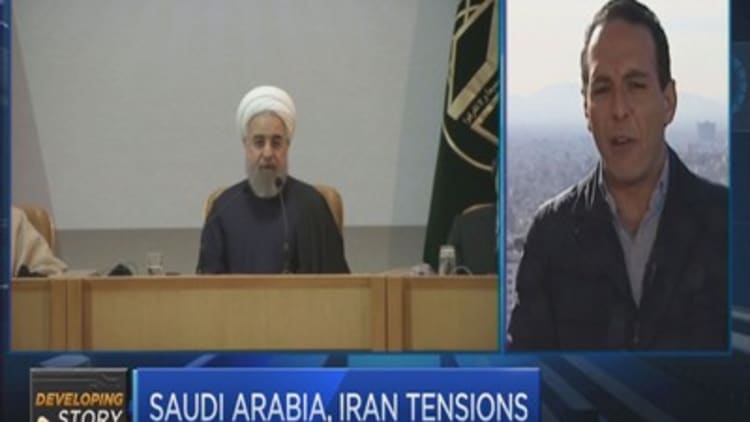One of the largest state-ordered executions in Saudi Arabia has sparked a diplomatic and trade row with Iran and left many concerned over destabilization across the Middle East.
CNBC explains why Saudi Arabia decided to execute a prominent Shiite cleric, what it means for Iran, and whether we can expect any resolution in coming weeks.
Why did Saudi Arabia execute Nimr al-Nimr?
Shiite cleric Nimr al-Nimr was among 47 people put to death this weekend for terrorist-related offences in one of Saudi Arabia's largest mass executions in years. Sunni men accused of launching al-Qaida attacks over 10 years ago were among those executed.
Al-Nimr was an outspoken leader for younger Shiites — a minority sect of Islam that has repeatedly come into conflict with the Sunni majority across the Middle East. The sheikh was one of a handful of Shiites who was accused of being involved in shooting policemen, according to Reuters.
Why did everything flare up?

Critics say al-Nimr was actually targeted for denouncing the Saudi royal dynasty and helping to organize anti-government demonstrations in 2011 and 2012.
The execution was denounced by a number of political and religious figures in Iran— a Shiite stronghold in the region — including supreme leader Ayatollah Ali Khamenei, who said Saudi Arabia would face "divine vengeance" for al-Nimr's execution.
It led to protests where Iranians threw petrol bombs, set fires and broke furniture after storming the Saudi embassy in the Iranian capital of Tehran on Sunday. Police later arrested 40 people as Iran's president denounced protesters as "extremists," Reuters reported. Protests also took place in the Indian administrative region of Kashmir and in Bahrain, according to reports.
What was the reaction?

Saudi Arabia quickly cut off ties with Iran, giving diplomatic envoys 48 hours to leave the country.
Later Monday, Saudi Foreign Minister Adel al-Jubeir told Reuters that the cutting of ties would extend to stopping air traffic between the countries, ending commercial relations and barring its citizens from travel to the Islamic Republic,
Iranian pilgrims, however, would still be welcome to visit Mecca and Medina, Jubeir added.
Bahrain, a Saudi ally, followed suit on Monday morning. The United Arab Emirates also said it would wind down its own relations with Iran, announcing it would cut the number of diplomats allowed in the country, according to the country's state news agency.
Sudan was added to the growing list, saying Monday it would immediately sever ties Iran, according to a Foreign Ministry statement cited by Reuters.
However, Western powers including France have called for reduced tensions between Iran and Saudi Arabia, with Germany urging dialogue, adding that the execution could increase religious tensions across the region.
A German government official told reporters at a press conference Monday that there were currently no plans to impose sanctions on Saudi Arabia over the executions.
What’s likely to happen now?
It's unclear how much further tensions will escalate between the two countries, although there could be an opportunity for mediated talks just days after the row erupted.
Russia has put up its hand as a potential intermediary, according to Reuters, citing Russian news agency RIA.
"As friends we would be ready to play, if it is demanded, an intermediary role in ... settling the existing contradictions and any new ones that arise between these two countries," a foreign ministry source told RIA.
Reuters contributed to this report.

